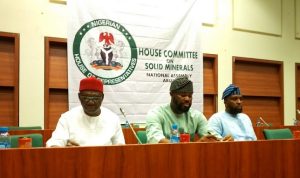Civil society groups working on mining campaigns in Nigeria have demanded an upward review of the extraction net value revenue of five percent proposed to go to community development associations in Minerals and Mining Act to 10% and want the revenue reviewed periodically.

The recommendation was made by the Environmental Defenders Network (EDEN) in a memorandum to the House of Representatives Committee on Solid Minerals and was endorsed by the Renevlyn Development Initiative (RDI), Community Development Advocacy Foundation (CODAF) and the Neighborhood Environmental Watch (NEW) Foundation.
At a Public Hearing on the Minerals and Mining (Repeal and Re-enactment) Bill, 2023 and the Nigeria Mineral Development Company Limited (Establishment) Bill, 2023 which held in Abuja on Wednesday, July 17, 2024, the groups said that increasing revenue that goes to the communities is just and befitting as host communities carry the biggest burdens of solid minerals extraction yet they have nothing to show for it in terms of benefit sharing.
In their memorandum to the House of Representatives Committee on Solid Minerals which convened the hearing at the National Assembly, the groups also said that the government should create an incentive for artisanal and small-scale miners to be formally captured and registered so that they can access loan facilities and duty-free purchase of mining machineries.
They said this would encourage miners to pay their royalties while operating within accepted standards.
The recommendations were presented by Philip Jakpor and Tobias Lenganan Dapam, Board member of Renevlyn Development Initiative.
The memorandum by EDEN proposed that all small scale and artisanal miners should be documented in a Miners Register opened and domiciled in the Ministry of Mining/Solid Minerals in the State, local government area headquarters and mining communities.
EDEN also frowned at the excessive powers given in the proposed bill to the Minister of Solid Minerals in Section 4, which it said should be subject to further review as most of the functions proposed are duplications of what the Ministry of Environment should be carrying out.
For instance, the group questioned Section 4 (u) of the bill which proposes that the Minister of Solid Minerals shall have the power to designate a mineral as a radio-active mineral and by radioactive regulations make special provisions for the exploration, exploitation, possession, export or otherwise dealing in the radio-active mineral.
Instead, it proposed that the powers of the minister of solid minerals should be shared with other ministries relevant to the subject, including environment.
Echoing the same concern, the memorandum by Renevlyn Development Initiative stated: “There is too much concentration of powers in the hands of the minister which should be shared with other ministries or government agencies. For instance, we recommend that the powers conferred on him to establish environmental procedures are shared with other relevant ministries including the Ministry of Environment to avoid duplication or clash of responsibility.”
The group also picked holes in specific items listed which the bill proposed be included in the Community Development Agreement such as educational scholarships and employment opportunities, countering that the agreement should be flexible enough to allow the host community to determine exactly what they want or what they want to use funds they get for as their needs may change depending on situations.
Earlier, Chairman of the House Committee on Solid Minerals, Gaza Jonathan Gbefwi, said that the Public Hearing is sequel to the Public Policy Dialogue on the Mineral and Mining Act 2007 which was held from February 12 to 13, 2024.
Gbefwi said that the re-enacted bill is intended to replace the Minerals and Mining Act 2007 which does not adequately represent the reality of mining practice across the globe which should be profitable to the government and the host communities.
